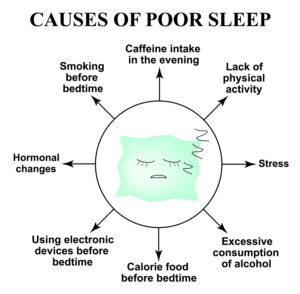 We tend to take sleep for granted. In spite of our nightly rituals and preparations, with age we struggle to get our 7-8 hours. Protecting brain health comes from quality sleep.
We tend to take sleep for granted. In spite of our nightly rituals and preparations, with age we struggle to get our 7-8 hours. Protecting brain health comes from quality sleep.
Some seniors think they must need less of it when the opposite is true. Friends tell me they can’t get to sleep before midnight, others complain about waking at four a.m. There are three kinds of sleep problems as we age:
- Can’t fall asleep easily
- Can’t stay asleep through the night
- Wake up early and can’t get back to sleep
Research from the National Sleep Foundation shows that adults need between 7–9 hours of solid sleep every night, yet 30% of adults aged 45+ are sleeping only 6 hours or less most nights. The sleep we’re getting isn’t as deep and restorative as it once was.
The New Science of Sleep and Aging
A huge body of scientific research into the mysteries of sleep over the last two decades has brought a new understanding of the role of sleep on cognition, overall well-being, energy, and memory. It turns out that quality sleep enriches our ability to focus, to learn, to memorize, and to make logical decisions.
A lack of sleep affects our overall health and leads to many of the chronic diseases of aging: obesity, diabetes, heart disease, increased inflammation, and a weakened immune system. These conditions are bidirectional, however, meaning that good sleep can reverse such symptoms.
And, for anyone who’s ever tried to lose weight, a lack of good sleep makes it harder to regulate food intake. But that’s not all. Even more important is the fact that quality sleep has a huge impact on preventing dementia and cognitive losses.
The Glymphatic System Protects the Brain
Much of the biological necessity of sleep still remains a mystery, however, some new research reveals our brains are busy doing critical restoration work as we sleep. The glial cells in the brain play a role in clearing out debris during sleep with what is called the glymphatic system. During deep sleep, these cells increase the clearance of beta-amyloid.
According to author Dr. Dale Bredesen, The End of Alzheimer’s, you may want to sleep on your side, since a recent study demonstrated that this position most effectively clear beta-amyloid.
Memories Are Made Like This
One of the most important roles of sleep in to help us consolidate memories. All our experiences and information that we take in during the day have to be processed and sorted. Some we keep as memories, others we discard as insignificant. Many of these steps happen during restorative sleep.
The process of storing information into short-term and long-term memory is called consolidation. Too little sleep or disturbed sleep profoundly affects our ability to focus, learn, form memories, and make decisions.
Protecting Brain Health: Sleep Apnea Risks
Anything that reduces oxygen at night is a risk factor for Alzheimer’s disease and dementia. Sleep apnea happens when there is obstruction of the upper airways such as with snoring. When there is shallow or paused breathing during sleep, the lack of adequate oxygen to the brain contributes to cognitive decline.
You can seek out treatment for the causes. Try the National Sleep Foundation for information on what to do. A portable oxygen machine, called a CPAP, can help.
Medications or Not?
Some sleep medications come with side effects and risks. Fortunately, there are natural supplements that support the body and protect brain health without negative side effects.
- Melatonin: This is my favorite. It is a naturally occurring hormone that declines with age. I like it because it doesn’t leave me groggy in the morning. It works by promoting a healthy circadian rhythm. It also can improve mitochondrial function.
- Tryptophan: This is an amino acid naturally found in many foods, including milk, eggs, poultry, fish, and pumpkin and sesame seeds. It is a precursor to serotonin, a neurotransmitter important in modulating the gut-brain axis.
- GABA: This is a neurotransmitter that blocks impulses between nerve cells in the brain and has a calming effect.
- Magnesium: This mineral is critical for brain functioning and many older adults are deficient in magnesium. It can have a calming effect. Taken before bed, it can decrease cortisol, increase melatonin, and improve sleep quality.
- Ashwagandha: This herb is used in Ayurvedic medicine to help the body adapt to stress. It improves memory in people with mild dementia.
- Bacopa monnieri: I’ve written about this plant before. It may be particularly effective for people who have trouble sleeping due to stress.
There are many options to help with irregular sleep. There are digital sleep trackers. Besides relying on melatonin supplements, I find that 30 to 60 minutes of exercise in the morning is a recipe for deep sleep at night.
There is no one magic bullet for protecting brain health, but improving your sleep means trying and using multiple methods. Find what works for you.

Recent Comments